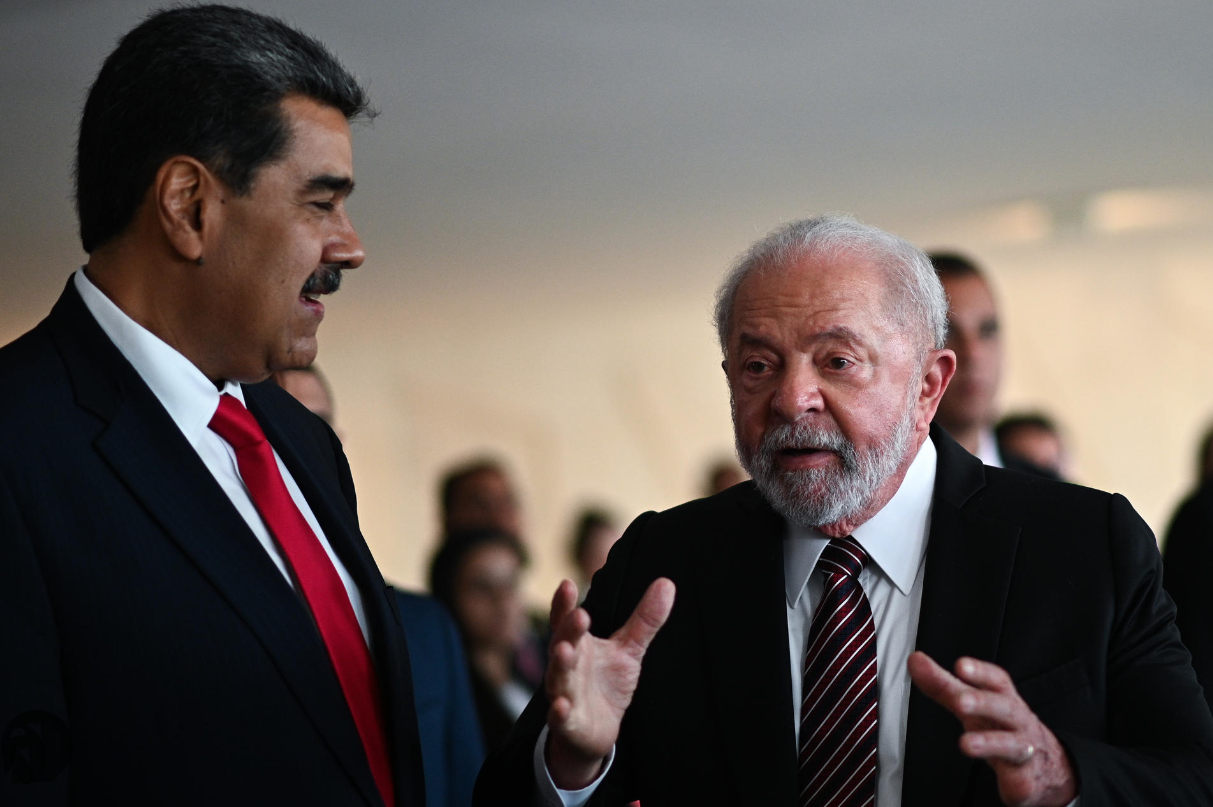Coauthors Génesis Dávila, Alonso Domínguez
Last May 29, during a press conference, President Luiz Inácio Lula da Silva said that Venezuela is a “victim of a narrative of anti-democracy and authoritarianism”. The statement was made together with Nicolás Maduro, who visited Brazil after eight years, at the Summit of South American heads of state.
The statement, of course, generated indignation and has several edges. One is that it turns the victimizer into a victim: given the context, it gives the Venezuelan state and its government the condition of the victim of an operation of its adversary, who has constructed, in a biased version of the facts, the image of a non-democratic regime. This would not be the first time that a victimizer assumes the role of victim. Rather, it often happens that the aggressor tries to be vindicated, justified, and even “understood”. The aggression takes a back seat and the real victim is accused of having tarnished the reputation of the aggressor. We have seen this in the case of Russia and the annexation of Crimea in 2014 and in China with the repression of the Uyghur Muslim population.
A second ridge arises from the use of the term “narrative”. We assume that President Lula referred in the press conference to a political narrative, that is, an explanation of the past and the present, which aims to mobilize a course of action. In this sense, a narrative would not be an academic explanation, but an interpretation with an intention, that is, a purpose other than finding the truth about facts. Its objective, instead, is to get people, on the basis of an explanation, to orient their behavior, act and make political judgments in one direction.
However, for a narrative to be successful, it cannot be completely divorced from reality. For example, if someone were to say today that Hitler did not order the Holocaust and that his legacy should rather be vindicated, such an interpretation would hardly gain many followers. Thus, if the narrative shared by most Venezuelans is that Maduro’s government has violated human rights and many of its officials are responsible for crimes against humanity and, therefore, justice and reparations must be obtained, it is not precisely because of an effective propaganda operation, but because it is rooted in the painful experience of many, of the thousands of Venezuelans who have been persecuted, tortured and killed for dissenting from the government’s policies, as well as of the millions who were forced to emigrate. We must also remember that Maduro and his regime are being investigated for crimes against humanity before the International Criminal Court.
In Brazil alone, the Inter-Agency Coordination Platform for Refugees and Migrants (RV4) estimates that there are 426,000 Venezuelans who fled hunger and the destruction of opportunities. The situation, however, goes beyond a humanitarian crisis, and its effects are projected in the region beyond emigration. According to the NGO SOS Orinoco, Maduro’s regime has promoted an extractivist approach to the Venezuelan Amazon, with tragic and lasting (perhaps irreversible) consequences in Venezuela and beyond.
By presenting the Venezuelan situation as the result of a narrative, President Lula recommends Maduro offer his own, one that is contrasted to his adversary. This could be interpreted as a good faith recommendation so that the pupil mends his ways and corrects what needs to be corrected: If they are telling you that you are not a democrat, then make a democratic election! However, it would be worth questioning: Who is Maduro’s adversary? Who is Lula defending: a dictator or his victims?
Nevertheless, narratives can create realities, regardless of whether they are based on real facts or not. In this sense, narratives should be evaluated not only by their adherence to facts or their symmetry with data based on reality, but also by their social effects. Today, Venezuela is a poor country, long believed to be rich but plundered by a corrupt political class, and on that narrative, Hugo Chavez came to power. The interpretation he offered the country about its past and present alienated our future because he ruined productive capacities and destroyed freedom. Maduro deepened to the utmost the folly of an impoverishing reading of our reality, and has never hesitated in violating human rights to compensate by force what he does not have in charisma nor has at his disposal in economic resources.
What is the narrative, then, suitable for the peoples of Latin America? Is it one that legitimizes and accepts human rights violations or another that defends them and makes them the center of politics? A narrative should not hide reality if it is painful or unjust; rather, it should free us from schemes that oppress or limit us and make us capable of overcoming poverty and injustice. It is crucial that political leaders commit themselves to honest and responsible narratives. Lula, we believe, can better choose his allies and the narratives he wants to promote for the region.
Génesis Dávila is a lawyer specialized in international law and human rights. President of Defiende Venezuela, an organization dedicated to presenting cases of human rights violations in Venezuela before international organizations.
Alonso Domínguez is a lawyer from Universidad Central de Venezuela. Coordinator of the Anti-Crimes Against Humanity Network.
*Translated from Spanish by Janaína Ruviaro da Silva













